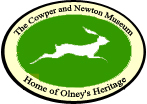|
THE MUSEUM PEOPLE
WORKS ORCHARD SIDE GARDENS |
 |
|
The Cowper and Newton Museum
|
|
The Cowper and Newton Day 2003
|
|
The third Annual Cowper and Newton Day, held on Saturday 26 April, was on the intriguing theme of 'William Cowper and His Women'. This year, the weather was kind, and our visitors from far and wide were able to enjoy to the full the Museum, the garden, and the programme of events, both indoors and in the open.
Cowper's key relationships with his cousin Theadora, Mary Unwin and Lady Austen are well known, but every age will wish to interpret the precise significance of these in its own way. Moreover, other female friends and acquaintances were also important to him: he liked women, they were charmed by him, and all contributed in different ways to the enrichment of his work. Ken Smith opened the proceedings with a subtly argued examination of the interweaving of Cowper's feelings for his mother, Theadora, and Mary Unwin, and how these impinged on the conduct of his relationship with Lady Austen, leading on to a consideration of her influence on his work and his contribution to the feminisation of literature in the late 18th century. Elizabeth Knight and Jeremy Cooper then treated us to an entertaining 'two-hander', with Elizabeth exploring the poet's association with the womenfolk of Olney, and Jeremy giving vivid readings from his letters and other contemporary documents. It provided many insights into the complexities and tensions within Cowper's household - particularly Mrs Unwin's daughter Susanna's resentment of Cowper's apparent 'sponging' on her mother, and the presence of Mary's half-sister Patty Wilson's child, Hannah, as servant/dependent. Moving into the wider community, we were given a sense of the hard lives of the lacemakers, the prevalence of fatal illness and the controversy surrounding compulsory inoculation of the poor, and the religious life of Olney. It was interesting to learn that Cowper thought the rote technique of the 'tells' or working chants of the lacemakers could be adapted to teach the Bible, via hymns written by himself. Elizabeth concluded with a lively sketch of the Newton household at the Vicarage, and Mrs Newton's important role in helping to sustain the friendship between the two families. After an excellent buffet lunch provided by the ladies of the Olney and District Women's Institute Market Stall, Elizabeth led a delightful walk from Olney, across the meadows of the Ouse valley, and through the lovely gardens of Clifton Reynes Old Vicarage (by kind permission of Mr Andrew Marchant). The views from the high ground were perfect, and we were reminded of Cowper's love of these scenes by readings from The Task and the letters, given en route by Jeremy Cooper and Barbara Evans Rees.
The walk ended with an informative tour of Clifton Reynes parish church and its monuments, conducted by Nick Berrill. Returning to the Museum, after tea and biscuits many of the participants repaired to Cowper's bedroom for the now traditional session of favourite poems and letters relating to the day's theme. Again in accordance with tradition, the day was rounded off with a thoroughly enjoyable sherry reception and dinner at the Olney Centre. As after-dinner speaker, Dr Conrad Brunstrom from the University of Ireland gave an apparently impromptu but in fact highly crafted and amusing talk - with minimal notes - on the theme ' "The Fair commands the song": How did Cowper love women?'. Following a tactful exploration of aspects of Cowper's sexuality, Dr Brunstrom was content to leave the questions raised ultimately unresolved. So ended the day's investigations, which had thrown a great deal of new light on Cowper's life, work and personality, while wisely refraining from any claim to definitive answers where none exist. Tony Seward |
|
|
